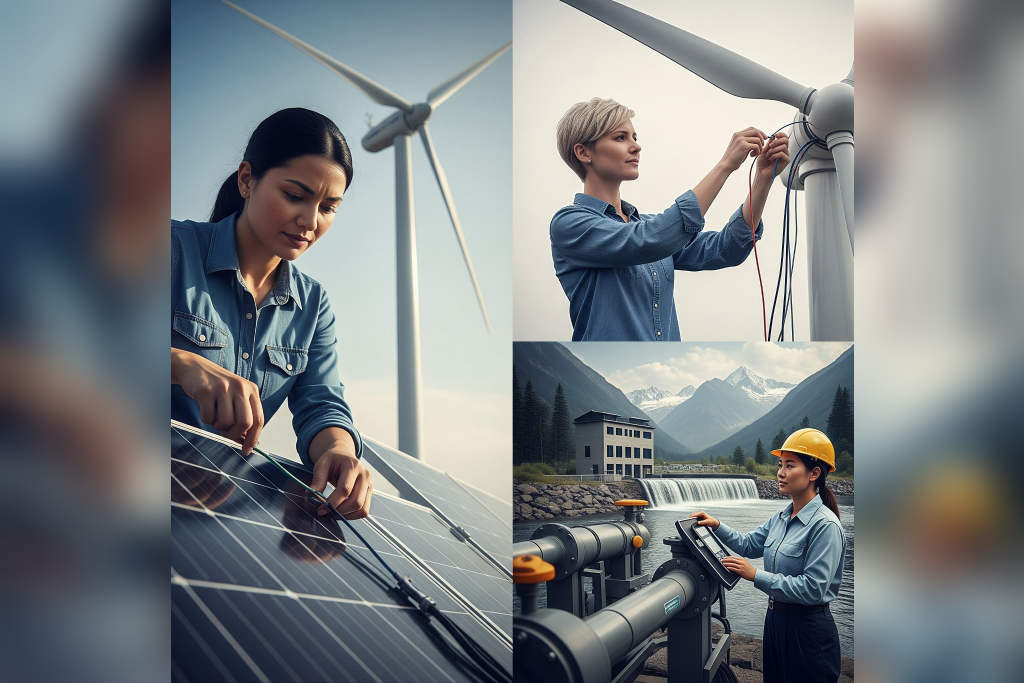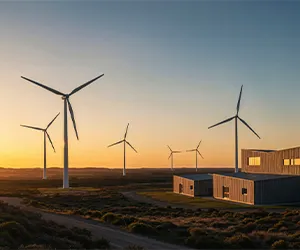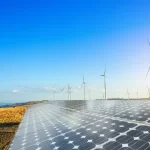Introduction
With the world moving to a sustainable future, women are on the card to the renewable sector like never before. Renewable energy has seen its strength to be highly effective in reducing or minimizing the problems of climate changes, energy security and economic prosperity. Yet, the low number of females in the clean tech sector and sustainability professions is one of the major issues of this change.

Although they contribute to almost half of the entire working population, women are still underrepresented in the STEM area, such as sustainable energy occupations. It is a gap that constrains innovation, thinking and capacity of the sector to accommodate the rising power demands in the world. This gap is achievable through the involvement of women in renewable energy to create inclusive policies and innovative technological development.
This blog discusses the women in the renewable energy sector, the challenges of women and excellent women leaders transforming the renewable energy sector. We also capture the problems which may be accepted as the means of increasing the number of women interested in the sector of clean tech as a profession.
The Role of Women in Renewable Energy
Breaking Barriers in Leadership and Innovation
Women are making outstanding contributions towards renewable energy at leadership, engineering, research, and policy levels. They introduce different world views to the problem-solving process, resulting in more innovative and inclusive solutions. Women make up about 32% of all renewable energy jobs worldwide, according to the International Renewable Energy Agency (IRENA), while only 22% of traditional energy jobs are held by women.
Women in Engineering and Research
Women engineers and researchers lead the charge in designing clean energy solutions, ranging from innovations in solar panel efficiency to wind turbine design. Their work informs the next generation of sustainable energy careers, with more cost-effective and efficient renewable power solutions.
Women in Policy and Advocacy
Women are key to policy-making, advocating for clean energy transformation and climate action. Christiana Figueres, the former Executive Secretary of the UNFCCC, has been at the forefront of international climate negotiations, demonstrating how gender diversity enriches environmental governance.
Women in Business and Entrepreneurship
The clean tech industry has also witnessed a growing number of female businesswomen. Startups led by women are creating innovative products in the field of energy storage, smart grids, and energy efficiency, propelling the industry forward with new ideas.
Challenges & Barriers
Gender Gap in STEM and the Energy Sector
Despite the advancements, there are still huge gender disparities in STEM as well as in the energy sector. Women only occupy 28% of the labor force in STEM, restricting their entry into sustainable energy jobs.
Workplace Challenges and Biases
Biases in the workplace affect many women working in renewable energy, such as unequal compensation, few opportunities for career progression, and restricted access to leadership positions. The under-representation issue in the clean tech sector is exacerbated by systemic and cultural barriers that deter women from pursuing careers in the field.
Lack of Representation in Leadership
Although women have made advancements at the entry level, they are underrepresented at leadership level. In a most recent study conducted in 2021 by BCG, it revealed that only 13 percent of members on the executive boards of large energy firms are women. The result is that the energy policies decision-making process is affected on the one hand, and that there are reduced viewpoints in terms of diversity in decision-making.
Inspiring Women Leaders in Renewable Energy
1. Christiana Figueres – Climate Policy Pioneer
Christiana Figueres was instrumental in brokering the landmark Paris Agreement, a strong voice for sustainable energy policy and climate action. Her efforts have encouraged numerous women in STEM to enter a career in sustainability.
2. Dr. Katharine Wilkinson – Advocate for Gender Equity in Climate Action
Dr. Wilkinson is a prominent climate change and gender equality voice. In her work on Project Drawdown, she speaks to the need for women’s leadership in renewable energy.
3. Dr. Ellen Williams – Innovator in Clean Tech Research
Dr. Williams has made important contributions to energy storage research, assisting in the development of next-generation battery technologies instrumental in renewable energy uptake.
4. Damilola Ogunbiyi – CEO of SEforALL
Damilola Ogunbiyi spearheads Sustainable Energy for All (SEforALL), an organization committed to achieving universal access to renewable energy. Her efforts close energy access gaps in developing countries.
5. Laura Stachel – Founder of We Care Solar
We Care Solar, founded by Laura Stachel, offers solar-powered solutions to enhance healthcare services in remote locations and serves as an example of the contribution of women to the energy sector.
Encouraging More Women in the Industry
Mentorship and Support Networks
In order to steer young women towards careers in renewable energy, mentoring programs are essential. Career counselling and networking opportunities are offered by groups such as Women in Clean Tech & Sustainability (WCS) and Women in Renewable Energy (WIRE).
Educational Initiatives and Scholarships
Investing in STEM education for women is key to closing the gender gap. Scholarships and university initiatives inspire more women into the clean tech industry, allowing them to acquire technical expertise and industry experience.
Corporate Policies for Gender Diversity
Firms that practice inclusive hiring, equal pay, and flexible working experience higher levels of female engagement in energy careers. Empowering women to hold positions in leadership results in greater innovation and better industry performance.
Conclusion
Women in renewable energy are the agents of change and influential factors in the sector. From research and engineering to policy-making and entrepreneurship, they are shaping the future of sustainable energy careers. Nevertheless, disadvantages like gender discrimination, leadership disparities, and injustices in the workplaces still exist.
Education, mentorship opportunities and workplace practices must be invested in as a way of closing this gap. We can hasten the shift to a more diverse and sustainable energy future by empowering women in the clean tech and energy sectors.
Future of renewable energy The future of renewable energy will lie within the hands of people who aren’t afraid of how hard to work. Making sure that women are not an exception, but at the helm of the sustainable energy phenomenon called clean and green through the ages.
Frequently Asked Questions (FAQs)
Having more women in energy fosters diversity, drives innovation, and ensures a more inclusive and sustainable energy transition. Gender-diverse teams are proven to make better business decisions and contribute to stronger industry growth.
Women face barriers such as gender biases, limited career advancement opportunities, wage gaps, and underrepresentation in leadership roles. These challenges highlight the need for stronger inclusion policies and support networks.
Through mentorship, scholarships, and corporate policies that promote gender diversity, more women can be encouraged to enter and thrive in the clean tech industry.
Yes, several organizations such as Women in Renewable Energy (WIRE), Women in Clean Tech & Sustainability (WCS), and Women in Solar Energy (WISE) provide networking, mentorship, and career development opportunities.
Women in policy-making advocate for climate action, renewable energy transitions, and equitable energy access. Leaders like Christiana Figueres have been instrumental in shaping global energy policies.












